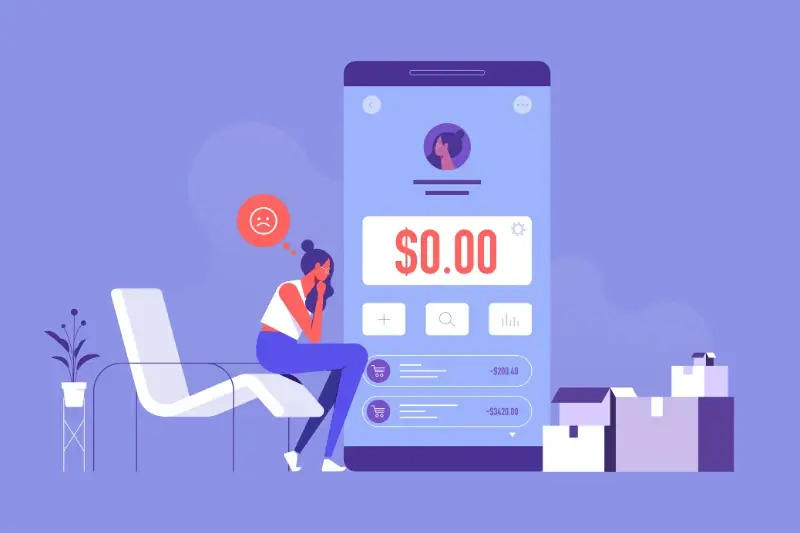Enterprise Mobile App Development What Every Executive Needs To Know
Nine out of ten enterprise mobile app projects fail to meet their original objectives. That's a staggering statistic when you consider that companies are investing millions into corporate mobile apps every year. The problem isn't usually the technology—it's that executives often jump into enterprise app development without understanding what they're actually signing up for.
I see this happen all the time. A company decides they need an app, they get excited about the possibilities, and before you know it they're knee-deep in a project that's over budget, behind schedule, and doesn't solve the problem they set out to fix. The truth is, building corporate mobile apps isn't like building consumer apps; the stakes are higher, the requirements are more complex, and the margin for error is practically non-existent.
The most expensive mistake you can make is building the wrong app really well
That's why this guide exists. Whether you're looking to streamline internal processes, improve customer engagement, or create new revenue streams, understanding the fundamentals of enterprise app development will save you time, money, and quite possibly your sanity. We'll cover everything from initial business app strategy through to launch—because getting it right the first time is always cheaper than fixing it later.
Understanding Enterprise Mobile Apps
When most people think about mobile apps, they picture games or social media platforms. But there's a whole other category that's quietly transforming how businesses operate—enterprise mobile apps. These are custom-built applications designed specifically for companies to help their employees work more efficiently, communicate better, or serve customers in new ways.
Enterprise apps are different from consumer apps in several key ways. They're built with business processes in mind, they need to integrate with existing company systems, and they must meet strict security requirements. Think of them as digital tools that solve specific workplace problems rather than entertainment or general-purpose applications.
Types of Enterprise Mobile Apps
- Internal productivity apps for employees
- Customer-facing service applications
- Field service and remote work tools
- Sales and CRM mobile solutions
- Inventory and asset management systems
- Communication and collaboration platforms
The beauty of enterprise apps lies in their ability to streamline workflows that were previously clunky or paper-based. I've worked with companies who've transformed their entire operations simply by putting the right tools in their employees' pockets. Whether it's a field engineer accessing technical manuals offline or a sales rep updating customer records in real-time, these apps bridge the gap between desktop systems and mobile work environments.
Planning Your Business App Strategy
Right, so you've decided your company needs a mobile app—but hang on a minute. Before you start sketching wireframes or calling developers, you need to work out exactly what you're trying to achieve. I've seen too many businesses jump straight into development without a proper business app strategy, and it rarely ends well.
Start by identifying the specific business problem your app will solve. Are you trying to improve employee productivity? Streamline customer service? Give your sales team better tools? Your app should have a clear purpose that ties back to your company's goals. Without this foundation, you'll end up with a shiny app that nobody uses.
Understanding Your Users
Next, think about who will actually use this app. Corporate mobile apps serve different audiences—your employees, customers, or business partners. Each group has different needs, technical abilities, and expectations. A field service app for technicians needs different features than an executive dashboard.
Create user personas for each group who'll use your app. Include their job roles, technical skills, and daily challenges. This helps guide every development decision.
Setting Realistic Goals
Finally, set measurable goals for your enterprise app development project. Don't just say "increase efficiency"—define what that means. Perhaps you want to reduce report generation time by 30% or cut customer response times in half. These concrete targets will help you measure success and justify the investment to stakeholders.
Key Features Every Corporate App Needs
After working with countless businesses over the years, I've noticed that successful corporate apps share certain features—not because they're trendy, but because they actually solve real problems. The truth is, your employees don't need another complicated tool to learn; they need something that makes their work life easier.
User Authentication and Single Sign-On
Your team already juggles dozens of passwords daily. Single sign-on (SSO) integration means they can access your app using their existing company credentials—no new passwords to remember or reset. It's one of those features that seems basic until you don't have it, then everyone complains!
Offline Functionality
WiFi goes down, mobile signals drop out, and your sales team still needs to access client information during that important meeting. Smart offline functionality syncs data when connectivity returns, so work never stops. I've seen apps fail spectacularly because they couldn't handle poor internet connections.
Push notifications deserve a mention too, but here's the thing—use them sparingly. Nobody wants their phone buzzing every five minutes with updates that could wait. Focus on notifications that genuinely need immediate attention, like urgent approvals or system alerts. Your users will thank you for respecting their time and attention.
Choosing the Right Development Approach
Right, let's talk about the big decision that'll shape your entire enterprise app development project—how you're actually going to build the thing. I've seen executives get completely overwhelmed by this choice, and honestly, I don't blame them. The technical jargon alone is enough to make anyone's head spin!
You've got three main paths to consider for your corporate mobile apps. Native apps are built specifically for one platform—think iOS or Android—and they perform brilliantly but cost more since you need separate versions. Cross-platform apps use frameworks that work across multiple devices with shared code, which saves money and time. Then there's web apps, which run in browsers and are the most budget-friendly option.
Performance vs Budget Trade-offs
Here's what I tell all my clients when we're planning their business app strategy: there's no perfect choice, only the right choice for your situation. If your app needs to access device cameras, GPS, or handle complex animations, native might be your best bet. For simpler business tools or internal apps, cross-platform solutions work beautifully.
The best development approach is the one that matches your users' needs, not the latest tech trend
Don't let anyone pressure you into the most expensive option just because it sounds impressive. I've built plenty of successful enterprise applications using cross-platform approaches that saved companies thousands whilst delivering exactly what their teams needed.
Security and Compliance for Enterprise Apps
Right, let's talk about the bit that keeps executives up at night—security. I've seen too many companies rush into app development without properly thinking through their security requirements, and trust me, that's a mistake you don't want to make. Enterprise apps handle sensitive business data, customer information, and often connect to your existing systems, which means they're prime targets for cyber attacks.
Data Protection Standards
Your app needs to comply with regulations like GDPR, and that's non-negotiable. This means implementing proper data encryption, secure authentication methods, and clear privacy policies. We're talking about multi-factor authentication, biometric login options, and encrypted data storage—not just because they sound impressive, but because they actually work.
Building Security from Day One
Here's what I tell all my clients: security isn't something you bolt on at the end; it needs to be baked into your app from the very beginning. This includes secure coding practices, regular security testing, and having a plan for security updates. Your development team should conduct penetration testing and vulnerability assessments throughout the build process—not just once at the end. And don't forget about ongoing monitoring once your app goes live.
Managing Costs and Timelines
Here's the thing about enterprise app development costs—they're almost always higher than you first expect. I've worked on countless corporate mobile apps over the years, and I can tell you that executives are often shocked when they see the real numbers. A basic enterprise app might start at £50,000, but most business app strategy projects end up costing between £100,000-£300,000. Complex apps with advanced security features? You're looking at £500,000 or more.
The timeline part is where things get tricky. Most corporate mobile apps take 6-12 months to build properly—and that's after you've sorted out all your planning. I always tell clients to add 20% buffer time because something will go wrong. Your security team will want changes. Your users will request new features during testing. The compliance team will discover new requirements halfway through. This is exactly why understanding what your app developer will need from you upfront can prevent costly delays and miscommunication.
Breaking Down Your Budget
Development typically eats up 60-70% of your budget, but don't forget about ongoing costs. You'll need money for app store fees, hosting, maintenance, and updates. Security audits alone can cost £10,000-£25,000 annually for enterprise apps.
Get three detailed quotes from different agencies before making any decisions. The cheapest option rarely delivers what you actually need for executive app guide requirements.
Testing and Launch Strategies
Right, so you've built your enterprise app—now comes the bit that separates the professionals from the amateurs. Testing isn't just about finding bugs (though we'll find plenty of those!); it's about making sure your app actually works in the real world with real people doing real work.
Start with your internal team first. Get them using the app for their daily tasks before you roll it out company-wide. This phase always throws up issues you never expected—like how the app behaves when Sarah from accounting tries to upload a 50MB spreadsheet or when the sales team attempts to use it on that ancient tablet they refuse to replace. There are proven ways to streamline app development processes that can help identify these issues earlier and reduce testing time.
Phased Rollout Approach
Don't launch to everyone at once—that's a recipe for chaos. Pick a small group of tech-savvy employees first, maybe 20-50 people depending on your company size. They'll spot the obvious problems and give you honest feedback without panicking when something goes wrong.
Once you've ironed out the major issues, expand to a larger pilot group. This second wave should include people who represent your typical users—not just the early adopters who love trying new technology. Many companies find that app development fuels workplace productivity when employees feel involved in the rollout process.
Support and Training
People need help learning new systems, even simple ones. Create quick tutorial videos, set up help documentation, and make sure your IT team knows how to handle common questions. The smoother this transition feels, the more likely people are to actually use your shiny new app. Done right, this approach can even help strengthen business communication across your organisation.
Conclusion
Building enterprise mobile apps isn't rocket science, but it's not a walk in the park either. I've watched countless businesses get caught up in the excitement of having their own app without thinking through the basics first—and trust me, that never ends well. The companies that succeed are the ones that take time to plan their business app strategy properly, understand what their employees actually need, and pick the right development approach for their situation.
Security can't be an afterthought when you're dealing with corporate mobile apps; your IT team will thank you for getting this right from day one. Budget planning matters too—I've seen too many projects run over because nobody factored in proper testing time or post-launch support. The good news? When enterprise app development is done right, the results speak for themselves. Beyond productivity gains, well-implemented apps can even increase employee retention by making work more engaging and efficient.
Your app doesn't need to solve every problem on earth—it just needs to solve the right problems well. Start with your users, build something they'll actually want to use, and don't forget that launching the app is just the beginning. The real work starts when people begin using it and you start learning what works and what doesn't. Keep it simple, keep it secure, and keep listening to feedback.
Share this
Subscribe To Our Blog
You May Also Like
These Related Stories

The Hidden Costs Of Mobile App Development Most Businesses Miss

The Hidden Cost of Poor App Performance: What Every Business Owner Needs to Know





